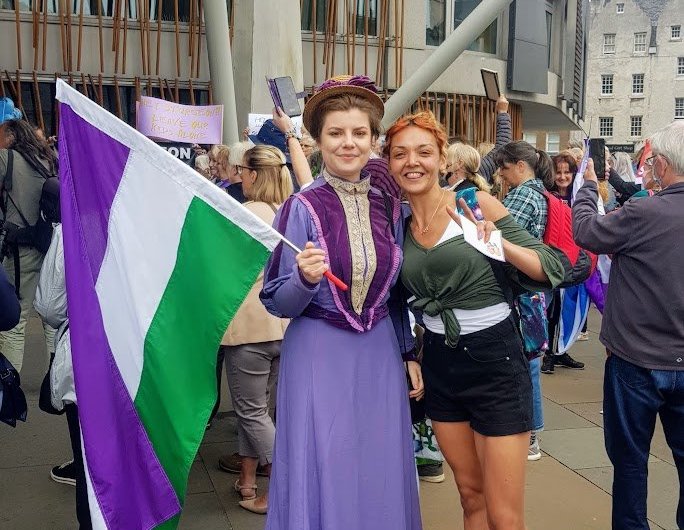Anti-trans protesters booed Nicola Sturgeon as she entered Holyrood. (Twitter/ amoozeboosh)
Anti-trans protesters booed Nicola Sturgeon, the only female leader of a UK country, while wearing suffragette colours without a hint of irony.
The protesters gathered outside Holyrood ahead of the first session of first minister’s questions of the new term on Thursday (2 September), following the announcement of the collaboration between the Scottish Greens and the SNP in government.
In a cooperation agreement published last month, the parties pledged to reform the Gender Recognition Act (GRA) within the first year of parliament, to “ensure the process by which a trans person can obtain legal recognition is simplified, reducing the trauma associated with that process”.
But anti-trans campaigners, including members of the so-called “gender critical” group For Women Scotland, decided to once again propagate the myth that self-identification for trans people will lead to predatory men being able to access women’s spaces.
Without any irony, a sea of protesters clad in the suffragette colours of green, purple and white furiously booed Sturgeon as she made her way into the building.
Speakers at the protest included Alba Party councillor Caroline McAllister, and LGB Alliance member Rhona Hotchkiss, with attendees posing for photos with a cardboard cutout of JK Rowling.

According to a speech at the rally by Lisa Mackenzie, one of the leaders of the anti-trans rights policy analysis collective MurrayBlackburnMackenzie, the protesters list of demands included keeping trans people out of sports teams and changing rooms.
Gender Recognition Act reform supported by Nicola Sturgeon ‘would not see trans people gain any new rights we don’t already have’
Reforms to the Gender Recognition Act would not actually affect the rights of trans people, or the spaces they have access to.
It would only simplify the process by which transgender people can change the gender marker recorded on their birth certificate, a right that trans people already have.
As Vic Valentine, manager of Scottish Trans Alliance, explained to the Guardian: “The current process requires people to provide a psychiatric diagnosis, intrusive medical reports about our bodies, and two years of evidence that we’ve been living as who we know ourselves to be.”
But reform of the Gender Recognition Act, Valentine added, “doesn’t impact the spaces or services we use in our day-to-day lives, and plans to change the law would not see trans people gain any new rights we don’t already have”.
